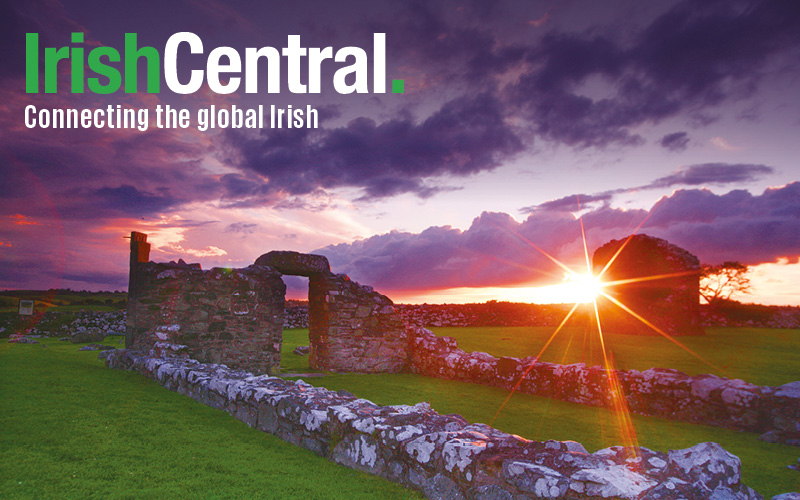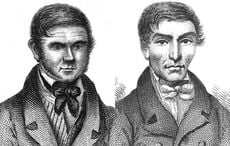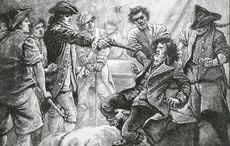My Ancestry results revealed I'm 68% Irish - something of a surprise to me as my Dad is British.
Editor's note: Throughout July, we'll be celebrating the O'Sullivan family on IrishCentral and the many great people who share the Irish last name. Throughout the month, we'll be looking at some of the most successful O'Sullivans/Sullivans and the places in Ireland you should visit associated with the surname.
It’s Memorial Day and I’m walking across Manhattan with a bunch of flowers in my hand.
A woman in her eighties catches sight of me and turns to her daughter-in-law.
“This boy looks like an O’Sullivan,” she says smiling.
And I do.
The woman’s name is Bridie and she’s the only one of my Grandad’s 13 siblings to immigrate to America. Moving to America this year has been a great privilege and one of them was meeting my extended family here.
When I factor in taking the AncestryDNA test I think I've learned more about my family this year than in any other.
People often express surprise that both my grandparents were born O’Sullivans: sometimes when my Mum’s been asked what her mother’s maiden name was and she replies “O’Sullivan,” people assume she’s misheard them. “No dear, not your maiden name, your mother’s maiden name?”
In case you were wondering all four of her grandparents were lifelong O'Sullivans too.
Mad as that may seem, in the parish of Tuosist on the Kerry side of the Beara peninsula that wouldn’t surprise anyone.
Read more: Are you an O'Sullivan/Sullivan? We need your help!

Grandad Paddy Joe.
An English friend of my parents once asked, bewildered, how post reached us without a house name.
“Wilson is easy,” we told him. “You address a letter to ‘Patrick O’Sullivan’ you’d have no chance around here.”
Read More: I took a DNA test and was shocked at what I discovered
Family nicknames are common in rural Ireland, but when most people are called either O’Sullivan, O’Shea or Healy they’re also an essential way of telling people apart.
My Grandad was an O’Sullivan Gloss (derived from ‘glas’, the Irish for ‘green’) and my Nan was an O’Sullivan Batt. Up the road, there’s a family whose passports say ‘O’Sullivan’ but everyone knows as ‘The Bachelors’ and a ten-minute drive away I’ve some cousins called O’Sullivan Dan.
At the local graveyard, my grandparents are buried only a few yards away from their own parents, some siblings and cousins too.
So when my Ancestry results came back telling me my genetic background was 68% Irish and it was concentrated in Munster I wasn’t that surprised.
Once my Nan said one of her grandparents was from a village called Kilgarvan about a 40-minute drive from Tuosist and I was shocked: hadn’t all our family been scratching out a living amidst the rocks and bogs of this one parish for centuries?

Digging up spuds on the family farm in Lehud, Tuosist
At least they weren’t from Cork. That would have truly shaken me.
That said, I was expecting an Irish result somewhere between 40 and 50%. The average Irish person is 95% Irish but my Dad is British. From him, I’m 21% British – mostly from Wales and the English West Midlands.
Read More: Maine Irish fundraise to bring Ancestry DNA tests to Galway
But clearly, somewhere back, his family hail from Ireland too: news to him.
The Welsh connection was expected: my Grandma Nona was born in London and spoke with the stereotypical cut-glass accent of a well-to-do Englishwoman of the wartime generation (think the Queen), but she always said she was “thoroughbred” Welsh.
Her parents were pretty grand, I got the impression – one worked as a stockbroker and the other was the daughter of a couple called Sir William and Lady Price – but they were authentically Welsh: both spoke the language in an era when you weren’t taught it at school and only ever knew it if you spoke it with your family.

Grandpa Tom and Grandma Nona on their wedding: my great-grandad didn't attend and said the marriage would only last six months. In the end it lasted 44 years.
They raised their family in England and never spoke Welsh at home – except when they didn’t want their two daughters to know what they were talking about – in her old age the only Welsh phrase my gran could remember was ‘bore da’ which means ‘good morning!’
The West Midlands coming back in the results was probably the most surprising part of the results. Bluntly, I’d never heard of anyone in the family coming from the region.
Read More: How Ancestry DNA helped me discover my official “Galway Girl” title
My Grandpa Tom was born in Hartlepool in the English North East – then as now one of Britain’s poorer towns. He left school at 14 to be a tea boy but ended up going to study engineering at the University of Durham – pretty impressive for a working-class man born in 1910. He finished the Second World War as a Captain in the Royal Engineers and spent the 1950s working for the colonial civil service in Malaya.
I don’t know anything about his Mum except that she died young, but I know his Dad worked on the railways and came from the Yorkshire Dales – one of the most beautiful parts of England. In my first job in America, I worked in a Mexican themed restaurant near Times Square and fondly remember a customer from Kentucky who had visited and fallen in love with the place after watching a TV drama about a veterinarian called James Herriot who lovingly cares for the Dales' many animals.
The results hinted at some distant Scottish background. My uncle mentioned once that Grandpa Tom had a Scottish grandparent – from where I don’t know – but Wilson is an even more common surname north of the border than it is in England and it would have explained why he was a Presbyterian. To this day he is the only Englishman or woman I have ever heard of baptized into that most Caledonian of denominations.
So I'm glad I took the test and now I want to dig a little deeper: as someone with a great love of the Irish language I'd be interested to know when my Mum's family stopped speaking it, and on my Dad's side I'd really love to look up his two grandfathers' service records from the Great War. Now it's over to me to find those things out.
Have you done any research into your Irish family? Let us know about it in the comments section, below.
*Originally published in December 2017.




Comments